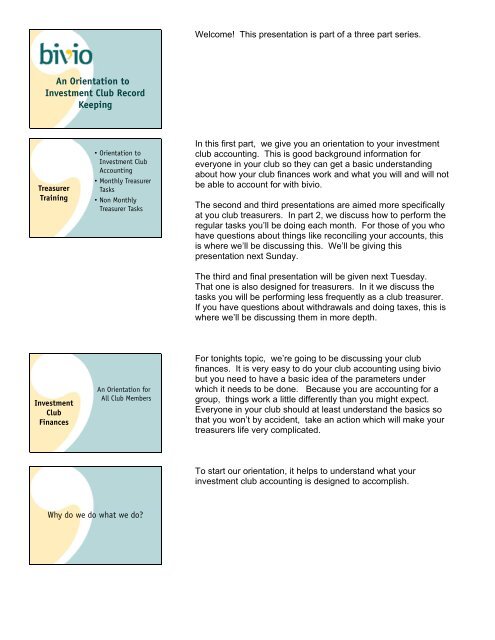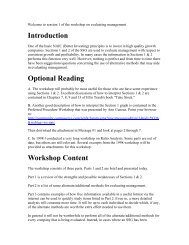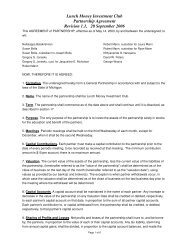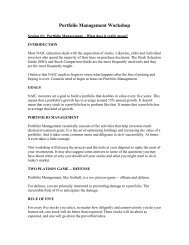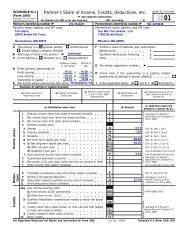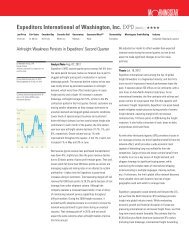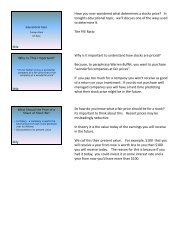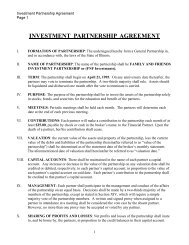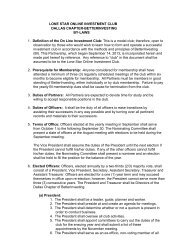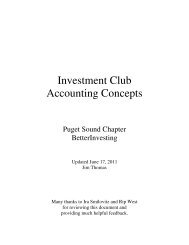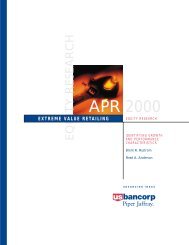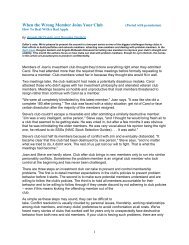An Orientation to Investment Club Record Keeping - Bivio
An Orientation to Investment Club Record Keeping - Bivio
An Orientation to Investment Club Record Keeping - Bivio
Create successful ePaper yourself
Turn your PDF publications into a flip-book with our unique Google optimized e-Paper software.
Welcome! This presentation is part of a three part series.<br />
<strong>An</strong> <strong>Orientation</strong> <strong>to</strong><br />
<strong>Investment</strong> <strong>Club</strong> <strong>Record</strong><br />
<strong>Keeping</strong><br />
Treasurer<br />
Training<br />
• <strong>Orientation</strong> <strong>to</strong><br />
<strong>Investment</strong> <strong>Club</strong><br />
Accounting<br />
• Monthly Treasurer<br />
Tasks<br />
• Non Monthly<br />
Treasurer Tasks<br />
In this first part, we give you an orientation <strong>to</strong> your investment<br />
club accounting. This is good background information for<br />
everyone in your club so they can get a basic understanding<br />
about how your club finances work and what you will and will not<br />
be able <strong>to</strong> account for with bivio.<br />
The second and third presentations are aimed more specifically<br />
at you club treasurers. In part 2, we discuss how <strong>to</strong> perform the<br />
regular tasks you’ll be doing each month. For those of you who<br />
have questions about things like reconciling your accounts, this<br />
is where we’ll be discussing this. We’ll be giving this<br />
presentation next Sunday.<br />
The third and final presentation will be given next Tuesday.<br />
That one is also designed for treasurers. In it we discuss the<br />
tasks you will be performing less frequently as a club treasurer.<br />
If you have questions about withdrawals and doing taxes, this is<br />
where we’ll be discussing them in more depth.<br />
<strong>Investment</strong><br />
<strong>Club</strong><br />
Finances<br />
<strong>An</strong> <strong>Orientation</strong> for<br />
All <strong>Club</strong> Members<br />
For <strong>to</strong>nights <strong>to</strong>pic, we’re going <strong>to</strong> be discussing your club<br />
finances. It is very easy <strong>to</strong> do your club accounting using bivio<br />
but you need <strong>to</strong> have a basic idea of the parameters under<br />
which it needs <strong>to</strong> be done. Because you are accounting for a<br />
group, things work a little differently than you might expect.<br />
Everyone in your club should at least understand the basics so<br />
that you won’t by accident, take an action which will make your<br />
treasurers life very complicated.<br />
To start our orientation, it helps <strong>to</strong> understand what your<br />
investment club accounting is designed <strong>to</strong> accomplish.<br />
Why do we do what we do?
As an investment club, you’re a group of people<br />
owning a shared pool of investments<br />
you’ll want <strong>to</strong> keep track of your investments and track how they<br />
are doing. You’ll also want <strong>to</strong> track your ownership in the club.<br />
Since you’re running a financial group with the intent of making<br />
money, you’ll also need <strong>to</strong> file taxes <strong>to</strong> comply with tax laws.<br />
To do all that, all you need <strong>to</strong> do is enter some simple<br />
information in<strong>to</strong> bivio. Your treasurer just enters all the<br />
transactions you have in your brokerage account. But it is<br />
important <strong>to</strong> realize that behind the scenes there is some<br />
sophisticated accounting going on. It helps <strong>to</strong> get a little bit<br />
oriented <strong>to</strong> what that is, so that you keep things on your side of<br />
the screen simple.<br />
What do you need <strong>to</strong> know about your club accounting as an<br />
investment club member? First lets talk about your club assets<br />
and your club ownership.<br />
Assets<br />
=<br />
Liabilities + Owners Equity<br />
All accounting is based on a very simple equation. We call this<br />
the accounting equation. It states that the sum of your assets<br />
(what you own), is equal <strong>to</strong> the sum of your liabilities (what you<br />
owe) plus your owners equity. (what you can take away at the<br />
end of the day)<br />
<strong>An</strong> investment club is a simple business that does not have any<br />
liabilities.
So the accounting equation becomes even simpler. Your club<br />
accounting tracks<br />
What you own, your assets,<br />
<strong>An</strong>d what each persons ownership share is<br />
Your owners equity<br />
ASSETS = OWNERS EQUITY<br />
Assets<br />
• Cash<br />
• S<strong>to</strong>cks<br />
• S<strong>to</strong>ck Mutual funds<br />
• S<strong>to</strong>ck ETF’s<br />
• Options<br />
In a club, you’ll have these types of assets.<br />
First of all, you’ll probably have some cash. Cash is a club<br />
asset. This includes investments accountants consider<br />
“equivalent <strong>to</strong> cash” such as money market funds.<br />
Publicly traded s<strong>to</strong>cks<br />
S<strong>to</strong>ck mutual funds<br />
S<strong>to</strong>ck ETF’s<br />
If you subscribe <strong>to</strong> our Active Partnership service, you might<br />
also have bought or sold some options.<br />
The choices on this list give you a lot of investments you can<br />
choose from <strong>to</strong> build a club portfolio.<br />
Assets<br />
Each evening, after the markets close, the prices on all your<br />
investments are updated. The value of all of your investments<br />
and your cash is added <strong>to</strong>gether.<br />
This is called your club Valuation or the Net Asset Value (NAV)<br />
of your club. You can see it reported on a Valuation report. It<br />
will change every day because your assets are s<strong>to</strong>cks whose<br />
price changes daily. Essentially your club is managing a mutual<br />
fund.
Where Your <strong>Club</strong> Assets “Live”<br />
You may have several different accounts for your club assets.<br />
For example, sometimes clubs have both a brokerage and a<br />
bank account. You can see the cash balances in each of your<br />
accounts on the Accounting>Accounts page. In order <strong>to</strong> be able<br />
<strong>to</strong> reconcile your accounts each month, your treasurer will be<br />
tracking account transactions in bivio in an account representing<br />
the account they actually occur in.<br />
But it is important <strong>to</strong> understand that for the purposes of your<br />
accounting, all your assets are lumped <strong>to</strong>gether. No matter<br />
what account you keep them in, they are available for investing<br />
or paying club expenses.<br />
Brokerage Account<br />
At bivio, we like <strong>to</strong> encourage you <strong>to</strong> keep your club financial<br />
operations as simple as possible so nobody has <strong>to</strong> be an<br />
accountant and everyone can focus on the fun part of being in a<br />
club which is picking s<strong>to</strong>cks. For simplicity in keeping your club<br />
records, we highly recommend that you try and operate with<br />
only one account, a brokerage account. Each financial account<br />
that you have needs <strong>to</strong> be reconciled each month. The less<br />
accounts you have, the less work for your treasurer. Many<br />
brokers now offer free checking. Even if they don’t you should<br />
actually have minimal reasons <strong>to</strong> need checks for anything.<br />
There are other options you can use <strong>to</strong> pay the infrequent<br />
expenses an investment club should have.
Your club assets will increase when you receive income such as<br />
<strong>Club</strong> Assets<br />
dividends and<br />
Dividends<br />
Interest<br />
Member<br />
Payments<br />
$$<br />
SYK<br />
$$<br />
QSII<br />
GE<br />
$$<br />
$$<br />
$$<br />
$$ CTSH<br />
$$<br />
$$ FORR $$<br />
$$<br />
BOA $$<br />
<strong>Club</strong> Expenses<br />
Member<br />
Withdrawals<br />
S<strong>to</strong>ck Price<br />
interest coming in<strong>to</strong> your club from your investments.<br />
They will also increase when your members make contributions.<br />
S<strong>to</strong>ck Price<br />
<strong>An</strong>d when the value of any s<strong>to</strong>cks you own goes up.<br />
As part of your investing activities, you may exchange one asset<br />
type for another.<br />
Cash will be used <strong>to</strong><br />
buy s<strong>to</strong>ck.<br />
Cash will be received from selling s<strong>to</strong>ck.<br />
<strong>An</strong>d finally, the value of your club assets will decrease<br />
if you pay for any expenses<br />
a member withdraws some of his assets and<br />
The value of any s<strong>to</strong>ck you own goes down.<br />
Treasurers Job<br />
We have made it very simple for your club treasurer <strong>to</strong> keep your<br />
records. All they need <strong>to</strong> do is make sure that all the<br />
transactions from your brokerage are entered in bivio. If you use<br />
AccountSync, this will happen au<strong>to</strong>matically.<br />
It is very important that all transactions be recorded on the<br />
correct dates and that your records be kept up <strong>to</strong> date and agree<br />
with your financial statements. It is also important that you track<br />
all of your club’s financial accounts in bivio and that you record<br />
all of the transactions that happen in those accounts.
Reconciliation<br />
Monthly<br />
Match brokerage<br />
Confirm<br />
contributions<br />
Yearly<br />
Audit<br />
Dates of your transactions are very important in your club<br />
accounts. It is important that you know that your club records<br />
are being kept accurately.<br />
As part of your monthly treasurers report, your treasurer should<br />
verify (and be able <strong>to</strong> demonstrate)<br />
that your club records match the records from your brokerage.<br />
They should also provide you with a report you can use <strong>to</strong><br />
confirm your member contributions have been recorded<br />
accurately.<br />
In addition, you should plan <strong>to</strong> do a yearly<br />
club audit where members other than the treasurer confirm your<br />
records.<br />
Mistakes are usually easy <strong>to</strong> fix before taxes are filed or<br />
members make withdrawals. But corrections can become very<br />
difficult after that. It is in everyone's best interest that you all<br />
make sure you are comfortable that your club records are being<br />
kept accurately.<br />
Assets<br />
There is one final area of concern relating <strong>to</strong> your club assets. It<br />
is important <strong>to</strong> understand that while there are lots of things in<br />
the world you can invest in, you can’t use bivio <strong>to</strong> account for all<br />
of them. You could run a complicated partnership, invest in lots<br />
of different things and pay a CPA thousands of dollars a year <strong>to</strong><br />
prepare your tax returns. Thanks <strong>to</strong> the generosity of the<br />
people who make our tax laws, different types of investments<br />
can have specialized tax reporting rules you need <strong>to</strong> comply<br />
with. Sometimes clubs inadvertently get in<strong>to</strong> complicated<br />
investments because they are traded in public markets,<br />
discussed regularly in investing publications, on TV and on the<br />
internet and you can purchase them from your broker like<br />
s<strong>to</strong>cks. However, it is important that you know what you are<br />
buying so you’ll know you can use bivio <strong>to</strong> do all your accounting<br />
and tax reporting.
Assets<br />
Impossible<br />
• MLP’s<br />
• Futures<br />
• Forex<br />
• Real Estate<br />
Very Complicated<br />
• Reits<br />
• Commodity ETF’s<br />
• Etc.<br />
For example, we do not provide you with the accounting or tax<br />
reporting you’d need for investments in:<br />
Master Limited Partnerships- This one comes up fairly often<br />
because these are often <strong>to</strong>uted as “High yield” investments in<br />
popular investing publications. They are often pipeline and<br />
energy companies. Popular ones are Kinder Morgan, Enbridge<br />
Energy Partners and Linn Energy.<br />
We also get asked every now and then if we can account for<br />
things like Futures-<br />
Forex-Foreign exchange currency trading<br />
Real estate-You can have an investment club that invests in real<br />
estate. But you can’t use bivio <strong>to</strong> do your accounting and tax<br />
prep for you.<br />
There are other types of investments which we recommend you<br />
stay away from because they can make your club accounting<br />
very difficult, delay when your club and your members can file<br />
your taxes and increase your chances of your club and your<br />
members needing <strong>to</strong> file amended tax returns. They are<br />
REIT’s-These are real estate investment trusts. A popular one<br />
we often see is <strong>An</strong>naly NLY<br />
Commodity ETF’s – Just because something is called an ETF<br />
doesn’t meant they it is something we can account for. It will<br />
depend on what type of investment makes up the ETF. For<br />
example, Commodity ETF’s have become popular recently for<br />
people who want <strong>to</strong> own precious metals such as Gold or Silver.<br />
These ETF’s actually own the underlying commodity, they do<br />
not own s<strong>to</strong>cks. Two popular ones right now are GLD and SLV.<br />
The accounting and tax reporting for ownership of precious<br />
metals is different than that required for ownership of s<strong>to</strong>cks.<br />
<strong>Bivio</strong> does not provide you with the <strong>to</strong>ols you need <strong>to</strong> account for<br />
and report taxes correctly for these investments.<br />
The list could go on and on but I hope you get my point.<br />
There are just some investments that you should not purchase in<br />
your club if you’d like <strong>to</strong> keep your club accounting simple and<br />
be able <strong>to</strong> use bivio. <strong>Investment</strong> clubs are about learning <strong>to</strong><br />
invest in publicly traded corporations, not about learning <strong>to</strong> do<br />
accounting. Stick <strong>to</strong> our guidelines and you’ll still have lots of<br />
investments <strong>to</strong> choose from <strong>to</strong> build a portfolio and learn about<br />
investing.
There are new types of investments being developed and<br />
promoted every day. We have a page where we list specific<br />
tickers for investments we have run in<strong>to</strong> that will cause you<br />
problems. We call this our “Before You Invest” page. You can<br />
find a link <strong>to</strong> it on our master help page. This list is not<br />
comprehensive. We update it as we become aware of problems<br />
but there are probably investments out there that aren’t on the<br />
list yet but should be.<br />
If you have any question about something your club is<br />
considering investing in, please email us the ticker at<br />
support@bivio.com. We are glad <strong>to</strong> research an investment for<br />
you before you purchase it and get yourselves in<strong>to</strong> problems.<br />
Unfortunately, if you come <strong>to</strong> us after the fact, things can get<br />
pretty complicated. At that point, you may have ended up in a<br />
situation where you need <strong>to</strong> hire a CPA <strong>to</strong> adjust your<br />
accounting records correctly and prepare the correct tax forms<br />
for your club. You know what they say about an “Ounce of<br />
Prevention”<br />
ASSETS<br />
Of course one of the biggest questions you’ll have about your<br />
club assets is “how are we doing?”<br />
You’ll be able <strong>to</strong> compare the performance of your club portfolio<br />
directly with s<strong>to</strong>ck market indices and even mutual funds using<br />
the bivio performance benchmark report. This powerful analysis<br />
will give you a direct apples <strong>to</strong> apples comparison. This is much<br />
more accurate than comparing your results <strong>to</strong> performance<br />
numbers you’ll see in advertisements for mutual funds which<br />
don’t reflect your exact cash flow.<br />
On the other side of the accounting being done,<br />
ASSETS<br />
=<br />
OWNERS EQUITY<br />
is record keeping about your ownership in the club.<br />
There are important things <strong>to</strong> understand about how your club<br />
ownership is tracked. It affects how much you earn on your<br />
investment in the club and how much of the club earnings you<br />
will be taxed on.
<strong>Club</strong> members do not own a specific percentage of each of the<br />
individual assets of your club, they own a percentage of the <strong>to</strong>tal<br />
assets.<br />
Ownership<br />
<strong>Club</strong> Ownership<br />
SYK<br />
QSII<br />
GE<br />
$$ $$<br />
PETS<br />
CTSH<br />
$$<br />
Your ownership is accounted for using shares or what we call<br />
units. Owning units is just like owning shares in a mutual fund.<br />
The reason we track ownership using units is that bivio is<br />
designed <strong>to</strong> track unequal ownership of a pool of investments.<br />
They change in price each day. Using unit based accounting,<br />
you have the greatest flexibility <strong>to</strong> operate an investment club<br />
and do your accounting fairly even if everyone has not or cannot<br />
contribute the same amounts <strong>to</strong> your club at the same times.<br />
Each time you contribute money <strong>to</strong> your club<br />
you purchase units,<br />
It is fine for each club member <strong>to</strong> own a different number.<br />
if you’d like <strong>to</strong> take some money out,<br />
you redeem units.<br />
Each day, the value of a unit is determined by dividing the <strong>to</strong>tal<br />
asset value of your club by the number of units outstanding.<br />
You can find the daily value of a unit on the<br />
<strong>Bivio</strong> valuation report I showed you earlier.<br />
<strong>Club</strong> Ownership<br />
Your percentage of ownership at any point in time is your <strong>to</strong>tal<br />
units<br />
Divided by<br />
The <strong>to</strong>tal units in your club.
Your clubs profits and losses are divided up based on your<br />
ownership percentages at the point in time that they occur.<br />
You can see your percentage of ownership for any given date on<br />
the member status report.<br />
You can also see the <strong>to</strong>tal value of your share of the club on that<br />
date.<br />
It is determined by by multiplying the number of units you own by<br />
the daily unit value. This is just like the way you’d determine<br />
<strong>to</strong>tal value if you owned mutual fund shares in your personal<br />
investment account. If you owned 100 shares and the value of a<br />
share at the end of the day was $8.00, your mutual fund holding<br />
would be worth $800.<br />
Accounting>Members<br />
To properly do your accounting for units, member contributions<br />
and withdrawals are recorded a little differently than any other<br />
type of deposit or expense.<br />
The information needed <strong>to</strong> make entries is input on special<br />
Payments<br />
<strong>An</strong>d withdrawals forms accessed using these but<strong>to</strong>ns on the<br />
members screen. After the forms are filled in, bivio does the<br />
accounting <strong>to</strong> add or subtract the appropriate number of units <strong>to</strong><br />
each members account.<br />
Valuation Date<br />
Because you are purchasing or selling shares, one of the pieces<br />
of information you will provide on both the member payment and<br />
withdrawal form is a<br />
“valuation date”. The value of a unit on that date will determine<br />
how many units a member receives or redeems.<br />
To keep your record keeping the simplest, we recommend that<br />
you use the date of the deposit as the valuation date. That way,<br />
things work just like they would in a mutual fund. Members buy<br />
club shares at their value on the date of their contribution.
Allocating Income and Expenses<br />
5/1<br />
25% 20% 25% 20% 10%<br />
5/15-<br />
25 20 25 20 10<br />
Dividend<br />
Received-$100<br />
5/18-<br />
Deductible (25) (20) (25) (20) (10)<br />
<strong>Club</strong> Expense<br />
$100<br />
5/20<br />
30% 20% 20% 15% 15%<br />
5/26-<br />
30 20 20 15 15<br />
Dividend<br />
Received-$100<br />
So how is your club income and your expenses divided up<br />
between all of your members? On the date your investments<br />
earn income or your club has an expense, you are allocated<br />
your portion based on your percentage of ownership on that<br />
date. It’s important <strong>to</strong> understand that ownership percentages<br />
may change on every date a member contribution is recorded.<br />
This makes the dates of entries in your club accounting more<br />
important then dates in the record keeping for other<br />
organizations that you may have done. We call this time based<br />
allocation.<br />
Here’s an example of how income and expenses might be<br />
allocated <strong>to</strong> members over the course of a month.<br />
Suppose on May 1, these were the percentages each of these<br />
club members owned.<br />
On May 15, a dividend for $100 was received.<br />
It would be allocated <strong>to</strong> each person like this<br />
On May 18, the club had a deductible expense of $100<br />
It would be allocated <strong>to</strong> everyone like this.<br />
Now suppose on May 20, some of the members ownership<br />
percentages changed. This might happen if, for example,<br />
member payments for some of them (but not others) were<br />
recorded.<br />
Then, on May 26, another $100 dividend was received.<br />
It would now be allocated based on the new ownership<br />
percentages.<br />
Allocating Income and Expenses<br />
At the end of the year, each members income and expense<br />
allocations are tallied up and used <strong>to</strong> prepare your club taxes.<br />
We’ll be talking about those in a few minutes.<br />
The amount each member has been allocated is shown on a<br />
bivio report called the Member Tax allocations report. You can<br />
access it at any point during the year <strong>to</strong> see how you are doing.
“Equality”<br />
• Month after<br />
• Month<br />
• Month<br />
• Year after<br />
• Year<br />
• Year<br />
In a club, everyone is equal in the sense that income and<br />
expenses are allocated <strong>to</strong> you based on the number of shares<br />
you own.<br />
If I own more shares than you do, I will receive a greater <strong>to</strong>tal<br />
amount of income. This makes sense.<br />
<strong>Club</strong>s sometimes feel that there is some reason everyone needs<br />
<strong>to</strong> have equal ownership. Trying <strong>to</strong> accomplish that actually will<br />
complicate your club accounting The only way everyone would<br />
own exactly the same number of shares is if everyones<br />
contributions were recorded for exactly the same amounts on<br />
exactly the same days,<br />
Month, after month, after month (click, click, click)<br />
Year after year after year (click, click, click)<br />
“Equality”<br />
• Life happens<br />
• Legitimate<br />
• Personal issues<br />
• Withdrawals<br />
• New Members<br />
But, this is just not going <strong>to</strong> happen. It is inevitable that different<br />
club members will own different numbers of units. <strong>An</strong><br />
investment partnership is a long term undertaking.<br />
Life Happens<br />
People will have <strong>to</strong> miss payments for legitimate reasons<br />
People will have times where they can’t contribute as<br />
much as they used <strong>to</strong><br />
People might need <strong>to</strong> take out some of the money they<br />
have invested in your club<br />
People may want <strong>to</strong> join your club<br />
It doesn’t make sense <strong>to</strong> make members leave your club or<br />
not allow new members <strong>to</strong> join if they will actively<br />
participate but are unable <strong>to</strong> have quite the same<br />
monetary stake as other members.
“Equality”<br />
It’s not going <strong>to</strong><br />
happen<br />
It doesn’t matter<br />
We can tell you after years of participating in and working with<br />
investment clubs,<br />
That equal ownership is just not going <strong>to</strong> happen.<br />
The good news is that it doesn’t matter. Your club accounting<br />
is designed <strong>to</strong> account for everyones percentage of<br />
ownership accurately. If your treasurer is reconciling the<br />
books correctly each month, you can be sure your<br />
ownership is being tracked properly and you are being<br />
allocated the same amount of income and expenses in<br />
proportion <strong>to</strong> your ownership share as everyone else.<br />
Focus on learning and working <strong>to</strong>gether <strong>to</strong> optimize your<br />
portfolio performance.<br />
If your portfolio grows well, all members will benefit, even if they<br />
don’t benefit by exactly the same <strong>to</strong>tal amounts. You are a group<br />
working <strong>to</strong>gether <strong>to</strong> learn <strong>to</strong> manage a mutual fund. The fund<br />
doesn’t care who owns what.<br />
What matters is that each member is committed <strong>to</strong> participating<br />
in the group both monetarily and by providing research and<br />
education, not that each person owns exactly the same number<br />
of shares of the club.
Individual Expenses<br />
25% 20% 25% 20% 10%<br />
Equal $ Per Unit 25 20 25 20 10<br />
Equal $ Per Member 20 20 20 20 20<br />
Individual Expenses 30 5 0 25 25<br />
While we’re talking about expenses, another thing it’s important<br />
for everyone <strong>to</strong> understand about your accounting has <strong>to</strong> do with<br />
what we call Individual expenses.<br />
<strong>Investment</strong> club accounting is designed <strong>to</strong> account for <strong>Club</strong><br />
expenses. Those are expenses that apply <strong>to</strong> all the members of<br />
the club and that can be divided up either by member ownership<br />
percentage (an equal amount per unit that you own)<br />
or by an equal dollar amount charged <strong>to</strong> each member.<br />
<strong>An</strong> expense that you want <strong>to</strong> divide up in any other way is what<br />
we call an individual expense.<br />
You don’t want <strong>to</strong> pay individual expenses with your club<br />
accounts. There is no benefit <strong>to</strong> doing so and it will complicate<br />
your club accounting.<br />
Individual<br />
Expenses<br />
• Subscriptions<br />
• S<strong>to</strong>ck <strong>An</strong>alysis Tools<br />
• Educational<br />
materials for<br />
personal library<br />
• Shrimp cocktails<br />
and martinis<br />
Here are some examples of individual expenses:<br />
Subscriptions if everyone doesn’t participate in the subscription<br />
the same way. A common example of this is the personal<br />
portion of a Better Investing membership or an individual<br />
Manifest Investing membership where some club members want<br />
it and others don’t<br />
Unless your club feels s<strong>to</strong>ck analysis <strong>to</strong>ols are a club expense<br />
that your club should use club funds <strong>to</strong> purchase all at once for<br />
each member, this is an individual expense. If individuals want<br />
individual copies, they should purchase it for themselves directly.<br />
Same with educational Materials when they’re only for one<br />
members personal library<br />
<strong>Club</strong> dinner expenses come up fairly frequently. Unless you are<br />
dividing up a dinner tab based on member percentage<br />
ownership or equally between everyone, don’t pay for your<br />
dinner with a club check or from a club account. There is no<br />
way in your accounting <strong>to</strong> allocate the costs in any other way <strong>to</strong><br />
individual members.<br />
Individual<br />
Expenses<br />
NO<br />
BENEFIT<br />
<strong>An</strong>d, there is NO benefit <strong>to</strong> doing so. It will only make your<br />
treasurers job harder. To keep things simple, have individuals<br />
pay expenses directly that only apply <strong>to</strong> them. Don‘t deposit the<br />
money <strong>to</strong> cover them in your club accounts and don’t pay for<br />
them with a club check.
Taxes<br />
<strong>Club</strong> income and expenses that are allocated <strong>to</strong> you will<br />
determine the amount of taxes you will pay. Lets talk a little bit<br />
now about your investment club taxes.<br />
Partnership<br />
Pass through<br />
<strong>Club</strong>s like yours that use bivio are operating as a type of<br />
business entity called a partnership or a type of entity taxed like<br />
a partnership called an LLC. Uncle Sam has specific rules<br />
partnerships must follow when it comes <strong>to</strong> accounting and tax<br />
reporting.<br />
A partnership is what is called a pass through entity. There are<br />
no taxes paid directly by your club on your investment income. It<br />
is all divided up each year amongst your club members and they<br />
pay the taxes on it on their own personal tax forms.<br />
Prepare Taxes<br />
K-1’s<br />
As a partnership, your club needs <strong>to</strong> file an informational tax<br />
return on IRS form 1065. It reports the amount of income your<br />
club had and the amounts that have been allocated <strong>to</strong> each<br />
member <strong>to</strong> pay taxes on.<br />
Part of that return are forms called a K-1’s. There is one for<br />
each member. You’ll send all of them in with your club tax filing<br />
and you’ll give each member his or her copy. He or she will<br />
transfer the information from this form <strong>to</strong> their personal tax<br />
forms and pay any taxes that are due on it there.<br />
Who has <strong>to</strong><br />
file?<br />
Who has <strong>to</strong> file?<br />
You do. If your club has an EIN number you need <strong>to</strong> file club<br />
taxes. It does not matter how long your club has been in<br />
existence or how much income you have had. If anyone in your<br />
club thinks this is not the case, please refer them <strong>to</strong> a recent<br />
club café posting where a club was trying <strong>to</strong> figure out what <strong>to</strong> do<br />
about a $33,000 penalty they had been assessed because their<br />
members did not think they had <strong>to</strong> file in a year when they only<br />
had a very small amount of income.
When You’ll<br />
Receive Your<br />
K-1’s<br />
March 1<br />
Don’t expect <strong>to</strong> file your personal income taxes as early as you<br />
might have before you were in an investment club. You will<br />
need the income and expenses from your club K-1’s <strong>to</strong> report on<br />
your personal taxes but before your treasurer can prepare them,<br />
they will have <strong>to</strong> verify your club records against 1099 forms<br />
you’ll get from your financial institutions.<br />
They have until February 15 <strong>to</strong> send them <strong>to</strong> your treasurer.<br />
Therefore, you’ll probably find that a reasonable date <strong>to</strong> expect<br />
K-1’s from your club is March 1.<br />
Your Capital Interest In Your<br />
Partnership<br />
There is another tax consequence you have as a member of a<br />
club. Because you are a member of a partnership,<br />
you have a capital interest in a business. There are similarities<br />
between this and the ownership interest you have in a<br />
corporation when you own s<strong>to</strong>ck. There are special tax rules<br />
that apply when funds are put in<strong>to</strong> your club and when funds are<br />
taken out.<br />
Partnership<br />
• Tax basis<br />
• Capital<br />
gains/losses<br />
Just like when you own s<strong>to</strong>ck, you have a basis in your<br />
investment in your club<br />
and you might have capital gains or losses when you withdraw<br />
funds from your club.<br />
One thing club members often don’t know is that the capital<br />
gains tax on withdrawals from your club is in addition <strong>to</strong> the<br />
taxes you will pay each year when you are given your K-1’s. But<br />
don’t worry, you won’t get taxed twice. One of the things bivio<br />
does for you is <strong>to</strong> track all your financial his<strong>to</strong>ry with the club so<br />
that when you eventually withdraw money, you will have the<br />
information you need <strong>to</strong> pay the appropriate taxes.<br />
There are actually some nice tax rules relating <strong>to</strong> withdrawals<br />
taken from partnerships that you can use <strong>to</strong> your benefit <strong>to</strong> help<br />
you manage your taxes. We’ll discuss those later.
Tax Basis<br />
Your contributions<br />
+/- Income or losses<br />
+ Dividends/interest<br />
- Expenses<br />
- Withdrawals<br />
Your tax basis in your club is determined by<br />
the amount you’ve contributed over the years,<br />
plus or minus your share of any income or losses your club has<br />
recognized by selling investments,<br />
plus your share of any dividends and interest your club has<br />
received,<br />
Minus your share of any expenses and<br />
minus any money you’ve withdrawn from the club.<br />
These are the things that have been reported <strong>to</strong> you each year<br />
on a K-1 and you’ve been taxed on your personal taxes.<br />
You can find out what your<br />
tax basis is at any time, on the member status report. If you<br />
withdrew all your money from the club on the date of the report<br />
you would have a capital gain or loss equal <strong>to</strong> the difference<br />
between this column, plus any allocations you’ve accumulated<br />
during the current tax year, and the<br />
Market value of your share of the club shown in this column.<br />
Withdrawals<br />
Special Tax<br />
Considerations<br />
There are some interesting tax benefits <strong>to</strong> being a member of a<br />
partnership. They relate <strong>to</strong> taking money out of your club. Of<br />
course, withdrawals that are made <strong>to</strong>o often make it difficult <strong>to</strong><br />
manage an investment portfolio. Ask any fund manager whose<br />
mutual fund suddenly goes out of favor.<br />
But, there are cases where you or another club member might<br />
need <strong>to</strong> make a withdrawal so it is interesting <strong>to</strong> understand how<br />
they work.
Withdrawals<br />
First, you need <strong>to</strong> understand that there is more you need <strong>to</strong> do<br />
when someone withdraws than just look at what their account is<br />
worth and write them a check. This is a business you are<br />
withdrawing money from and there is a lot of accounting we<br />
need <strong>to</strong> do <strong>to</strong> update your records and prepare your taxes<br />
correctly. You don’t have <strong>to</strong> do the accounting yourself<br />
but you do have <strong>to</strong> know you need <strong>to</strong> determine the withdrawal<br />
amount and make the withdrawal entry using the special<br />
withdrawal form that I mentioned earlier.<br />
We’ll be discussing withdrawals in more depth in the third<br />
presentation of this treasurers training series. Make sure you<br />
don’t give a club member a check or tell a club member what<br />
they will receive without an understanding of how <strong>to</strong> fill in this<br />
form.<br />
Partial<br />
Withdrawals<br />
• Cash<br />
• No current taxes due<br />
if amount withdrawn<br />
is less than your tax<br />
basis<br />
If you need <strong>to</strong> withdraw some, but not all of your funds from your<br />
club, you can do so with no tax consequences as long as you<br />
take<br />
cash<br />
and withdraw less than your tax basis. We call this a partial<br />
withdrawal.<br />
Full<br />
Withdrawals<br />
• Cash plus appreciated<br />
s<strong>to</strong>ck<br />
• Gain deferred till<br />
s<strong>to</strong>ck is sold<br />
If you need <strong>to</strong> withdraw all your money and are<br />
paid using cash plus appreciated s<strong>to</strong>ck,<br />
Much of any gain can be deferred until you sell the s<strong>to</strong>ck. The<br />
basis in the s<strong>to</strong>ck you receive will be your tax basis in the club<br />
minus any cash you also receive.<br />
A gain that is taxed in the future is usually better than a gain that<br />
is taxed <strong>to</strong>day so this presents some interesting opportunities for<br />
you <strong>to</strong> defer gains on your investment in your club, perhaps <strong>to</strong> a<br />
point in time when you have some personal capital losses <strong>to</strong> use<br />
<strong>to</strong> offset it. Or, if you never sell the s<strong>to</strong>ck you receive, and it<br />
continues <strong>to</strong> show a gain when you die, your gain will never be<br />
taxed. Under current tax rules, the basis of inherited s<strong>to</strong>ck is<br />
stepped up <strong>to</strong> fair market value for the people that inherit it.
Your club treasurer does not have<br />
<strong>to</strong> be an accountant!<br />
We’ve covered quite a bit <strong>to</strong>day. I hope you can see why it is<br />
important for all the members of your club <strong>to</strong> have a basic<br />
understanding of your club finances. If you stay within the<br />
guidelines for running your investment club that we have<br />
outlined here, your club treasurer does not have <strong>to</strong> be an<br />
accountant. In fact, using bivio, your club accounting will be very<br />
simple and anyone should be able <strong>to</strong> do it. <strong>Club</strong>s only run in<strong>to</strong><br />
problems when they try create their own rules for operating<br />
without understanding the accounting and tax consequences of<br />
what they want <strong>to</strong> do. As we’ve been discussing, partnership<br />
accounting is a little different than what people may expect or be<br />
used <strong>to</strong>.<br />
If you don’t understand something your treasurer is doing or tells<br />
you they can’t do, don’t put your treasurer on the spot <strong>to</strong> be able<br />
<strong>to</strong> explain all the accounting or tax rules behind it. <strong>An</strong>y club<br />
member should feel free <strong>to</strong> email us at support@bivio.com with<br />
any questions. We’re glad <strong>to</strong> help clarify things not only for your<br />
treasurer but for any other member of your club.
Summary<br />
• File your taxes!<br />
• Correct records<br />
• Single financial<br />
account<br />
• No individual expenses<br />
• Payments and<br />
withdrawals<br />
• Type of investment<br />
• Equality<br />
• Ask questions<br />
Just remember these few points and you will be able <strong>to</strong><br />
run your investment club easily.<br />
Make sure your club is filing annual tax returns.<br />
Verify your records- this can’t be stressed enough. Make<br />
sure your treasurer gives a report each month and ask<br />
questions if you see something like a negative balance on<br />
a bank account. The current state of your finances is<br />
dependent on the dates of all the his<strong>to</strong>rical transactions.<br />
Make sure your records mirror what is happening in your<br />
financial accounts and that your ownership is being<br />
tracked correctly.<br />
Keep your record keeping simple by operating with only a<br />
single financial account.<br />
Only use your club financial accounts for investment<br />
related transactions that apply <strong>to</strong> all club members, not<br />
for individual expenses.<br />
Make sure your club ownership is tracked correctly. All<br />
member contributions need <strong>to</strong> be entered as member<br />
payments and any payouts need <strong>to</strong> be determined and<br />
recorded as Withdrawals using the correct forms.<br />
If you are unsure whether an investment is something<br />
that can be accounted for by bivio, ask us about it before<br />
you purchase it.<br />
Define equality as meaning that everyone is allocated the<br />
same amount of income and expense per unit of the club<br />
that they own. Let go of the need for everyone <strong>to</strong> own the<br />
same percentage of the club.<br />
Ask us at support@bivio.com if you have questions. We’re<br />
glad <strong>to</strong> explain things <strong>to</strong> any member of a club. Expect<br />
your treasurer <strong>to</strong> know how <strong>to</strong> use the program but don’t<br />
expect them <strong>to</strong> know all the underlying accounting.
Treasurer<br />
Training<br />
• Monthly Treasurer Tasks<br />
• Non-Monthly Treasurer<br />
Tasks<br />
For those of you who are or will actually be club treasurers or<br />
who want more specific detail on some of the <strong>to</strong>pics we’ve<br />
discussed here there are two additional parts <strong>to</strong> this treasurer<br />
training series that are coming up.<br />
First we’ll discuss monthly treasurer tasks. We will show you<br />
how <strong>to</strong> handle and record member payments, s<strong>to</strong>ck purchases<br />
and sales and investment income. We’ll cover how you should<br />
reconcile your records and give your monthly treasurer's report.<br />
We’ll also show you how you can set up bivio AccountSync <strong>to</strong> do<br />
many of these things for you au<strong>to</strong>matically each month!<br />
In the third part of the series, Non Monthly Treasurers Tasks,<br />
we’ll show you how <strong>to</strong> do some of the treasurer tasks you’ll do<br />
less frequently such as how <strong>to</strong> enter a withdrawal, how <strong>to</strong> enter<br />
club expenses, how <strong>to</strong> reimburse a member who pays an<br />
expense, what <strong>to</strong> do if a member pays in advance, your annual<br />
club audit and what you will need <strong>to</strong> know about preparing your<br />
club's taxes.<br />
Everyone is welcome. Both of these sessions are online and<br />
free. You can register <strong>to</strong> join us at www.bivio.com/club_cafe.<br />
Hope <strong>to</strong> see you then!<br />
QUESTIONS?


